If you’re thinking of playing ukulele, the first thing you need to do is to decide which type of ukulele to get. There are several different ukulele sizes, each with its own characteristics. The four standard ukulele sizes are soprano, concert, tenor, and baritone, but there are also a range of specialty ukulele models out there.
The concert and tenor uke are two of the most widely used sizes, along with soprano ukuleles. But how do the two compare? What are the differences, similarities, pros and cons of choosing a concert vs tenor ukulele?
Although both ukuleles use standard tuning, they differ in sound and size. The tenor ukulele is a bit larger than the concert, resulting in a warmer and fuller sound. The smaller concert has a bright, crisp tone. Tenor ukuleles are favored by pros, but concert ukes are the most commonly used ukuleles in general. Tenors are more versatile for a variety of techniques, but concerts are better suited for simply strumming rhythms.
Let’s take a closer look at the two most widely used ukulele variations to determine how they measure up to one another and help determine which is best for you.
Post Contents
Tenor vs Concert Ukulele: How Are They Similar?
First off, let’s explore the similarities between the concert uke and the tenor size ukulele.
Tuning
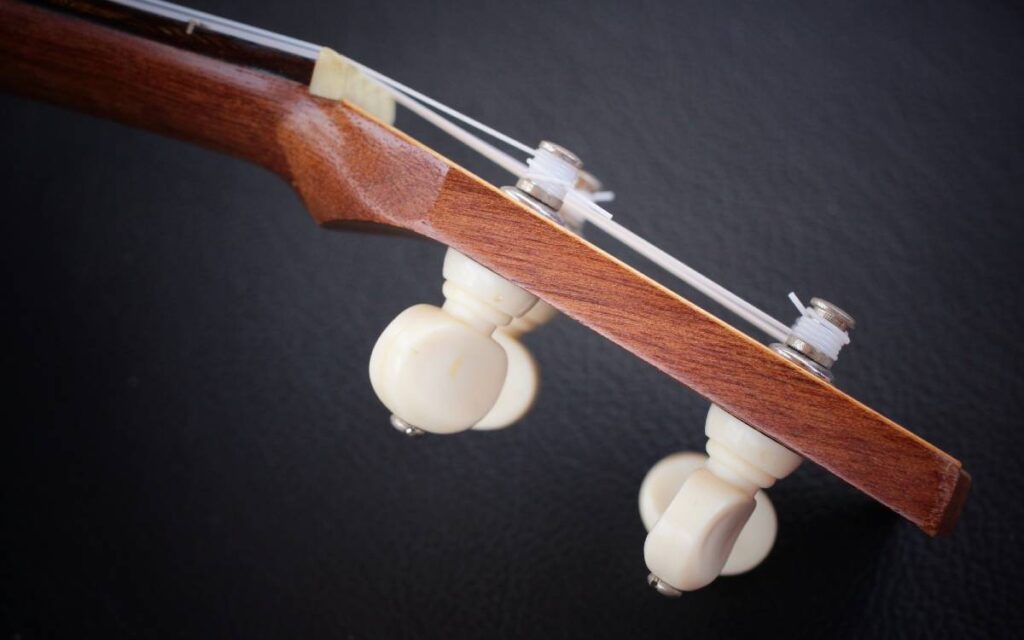
Concert and Tenor ukuleles are both tuned to standard ukulele tuning, which is G-C-E-A. While traditional ukulele tuning features a high g string, both ukes can be tuned with a low g string instead (this is called linear tuning).
Since these ukuleles are tuned to the exact same notes, they have all the same chords, and you can play all the same ukulele songs.
[diagram]
Both ukuleles are also equally able to accept alternate tunings and open tunings. Both ukuleles are incredibly versatile, and can be used for different musical styles. Anything you can do on a concert uke, you can do on a tenor uke.
That being said, they do differ a bit in their overall tone. Tenor strings sound slightly fuller, with more bass, whereas concert ukuleles have more of that bright traditional ukulele sound. We’ll go into more detail on the sound differences below.
Note: The soprano ukulele is also tuned to the G-C-E-A standard tuning. The exception is the baritone ukulele, which is tuned to D-G-B-E, like the top four strings of a guitar.
Number of Frets
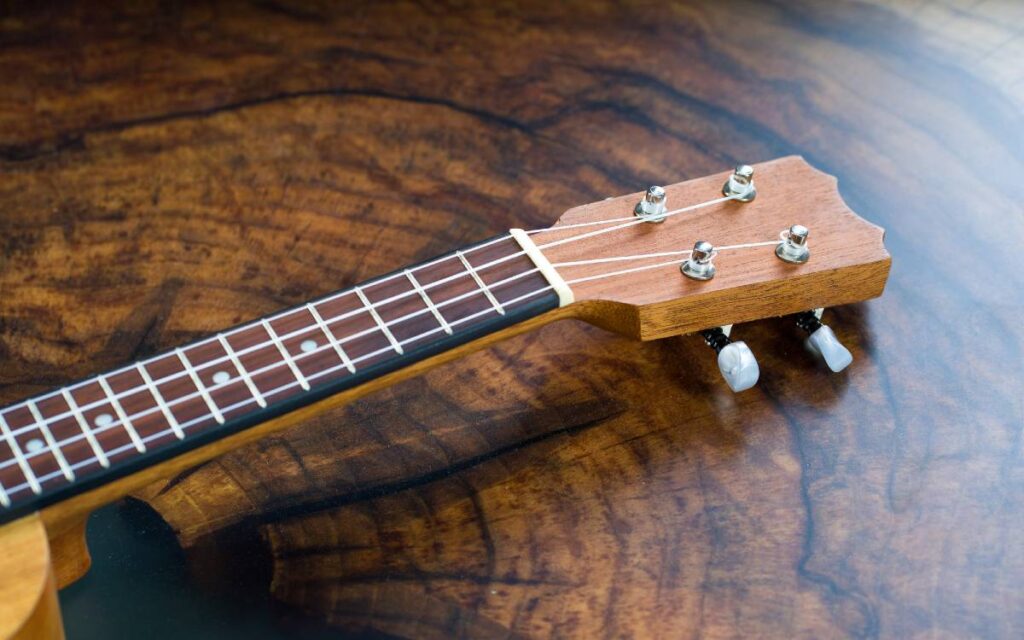
Concert and tenor ukuleles often have the same number of frets. This is generally about 18, but it can vary from 15-20 depending on the manufacturer. But overall, you’ll have the same number of frets to work with on both uke sizes.
Construction
Both concert and tenor ukes can be made using the same materials and methods. You can find examples of both made from solid wood and cheaper laminated wood, and they’ll both have similar options when it comes to fretboard materials, inlays, and binding.
Common materials for solid wood ukuleles are mahogany, koa, rosewood, cedar, spruce, and maple.
Concert vs Tenor Ukulele: How Are They Different?
While concert and tenor ukuleles are very similar instruments, they also have several differences that might make one a better choice for you.
Body Size
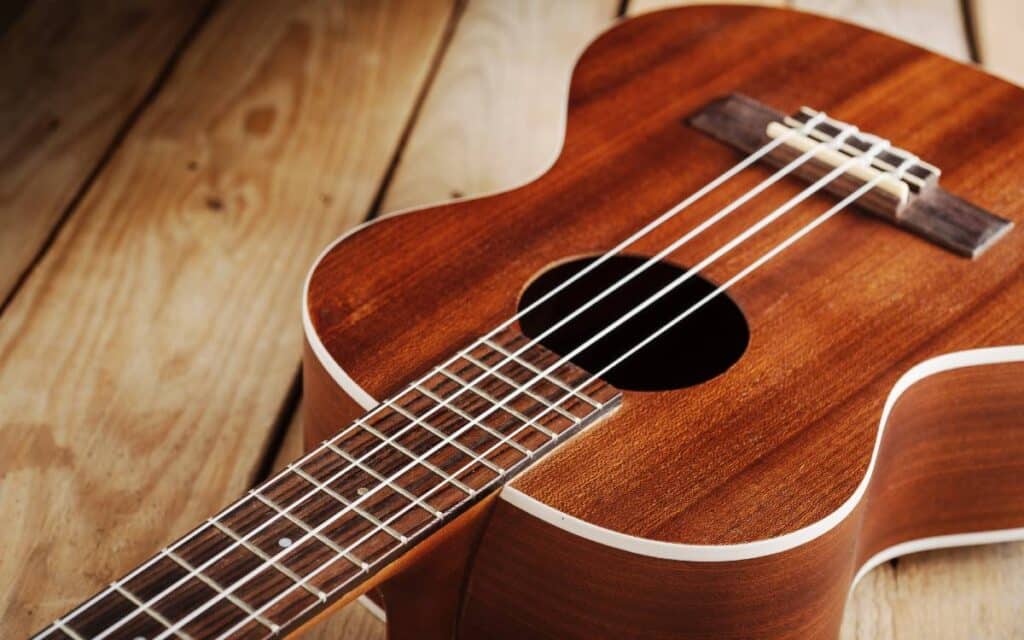
The overall size of these two ukuleles is the most obvious difference between them. The tenor size is slightly larger and longer than the concert size. The concert ukulele is about 23 inches long, while the tenor is about 26 inches long. Because of this size difference, the tenor body shape is a bit larger as well.
[diagram]
Because the tenor is an overall larger instrument than the concert, this can make it more comfortable to hold for some ukulele players. The body size also contributes to differences in tone and playability, which we’ll get into below.
However, many beginners start with a concert ukulele because it’s a good “tweener” size between the soprano ukulele and the tenor.
Scale Length
Scale length is the distance from the nut to the saddle of the ukulele. This does not affect the tuning, but it does affect the tone quality, playability, and string tension.
The scale length of a concert ukulele is about 15 inches, while the tenor ukulele is about 17 inches.
[diagram]
The longer scale length of a tenor requires a higher string tension to bring the strings up to pitch, whereas the shorter scale of a concert needs less string tension for the same notes.
Fretboard Size
Even though concert and tenor ukes generally have the same amount of frets, they often have different fretboard sizes.
Because the tenor ukulele does not have more frets than the concert, the longer neck and scale length and overall size allow for wider fret spacing. This means that there’s more room to fret notes and form chord shapes, which can be a lot easier for players with larger hands.
The shorter scale of the concert uke means that the fretboard is more compact. This could make it a bit more challenging for players with larger hands – although not as challenging as playing a soprano ukulele.
Sound and Volume
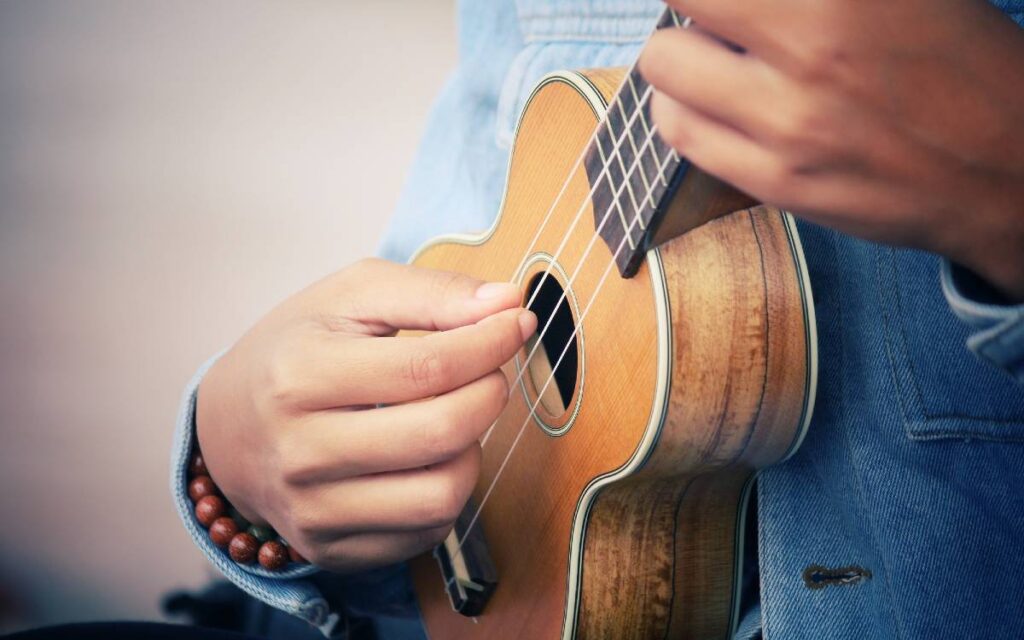
The most critical difference between any two instruments is the way they sound. All ukuleles sound unmistakably like a ukulele, but there are inherent differences between the tone characteristics of the various sizes.
Even though concert and tenor ukuleles are tuned the same way, they sound a bit different to the trained ear. This is because the size, scale length, and string tension changes the tone in various ways.
The concert ukulele is smaller in size and typically has a smaller and more shallow body shape. The smaller body chamber and the shorter scale length creates a thinner, jangly sound that more heavily emphasizes the treble tones. However, it is still deeper and more complex than the soprano size uke, which has a thinner sound than the larger sizes.
In contrast, the tenor ukulele is larger in size and scale, and has a deeper sound chamber. This changes the tone of the instrument significantly, creating a warmer sound that is deeper, with a fuller tone that emphasizes the bass a bit more. The larger body also allows the tenor ukulele to produce a louder sound, with more projection.
The fuller sound only of the tenor ukulele only enhances its versatility, and lends itself to a wide variety of playing styles – from finger picking to chord melody to basic strumming. Because of this, the tenor uke tends to be the favorite ukulele size among professional players. However, both ukes are capable of putting out a great sound.
Playability

When choosing a ukulele, playability is extremely important to consider. And the playability of different size ukuleles differs for everyone.
When talking about ukuleles, playability often comes down to a question of how big your hands are. Tenor ukuleles tend to be more comfortable for people with larger hands, or for those transitioning over from guitar. This is due to the wider fret spacing, and the larger body can also make it more comfortable to hold.
However, for children or people with smaller hands, a concert ukulele may be easier because they won’t have to stretch their hands as much to form chords. Whereas the fretboard might feel a bit cramped for someone with big hands.
That being said, neither instrument is particularly difficult to play, so it’s tough to go wrong with any of them here. Soprano ukuleles, on the other hand, are much tougher if you don’t have small hands.
Budget/Cost
All ukuleles are available in a very wide price range, regardless of the size, type, or brand of the instrument. You can find expensive, midrange, and cheap ukuleles in any of the types and sizes. The defining factor in ukulele prices is often the quality of the construction.
With that in mind, when comparing a tenor and a concert ukulele from the same manufacturer and range, the tenor will typically cost more. This is because of the larger body size, which means more materials used in its construction.
So, if you have a tight budget, you can usually get a concert ukulele for a bit cheaper than an equivalent tenor. It’s important, however, to not skimp out too much on instrument quality. A better instrument will both sound and play better, and encourage you to stick with practicing.
Concert or Tenor – Which Is Right For You?
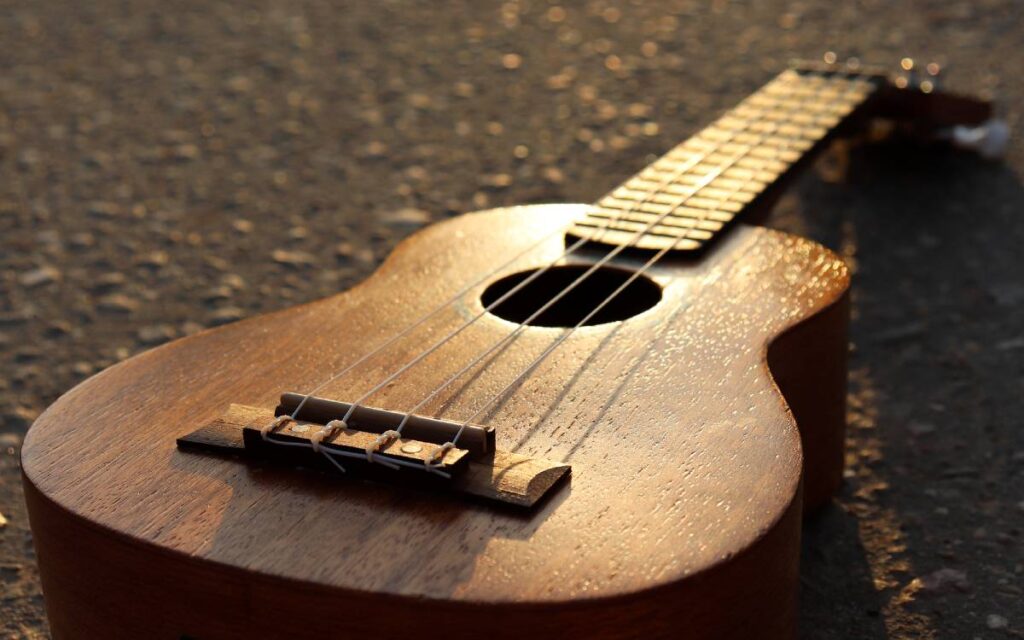
The right ukulele for you comes down to your personal preference, the sound you prefer, and the music you want to play. If you’re choosing between these two different ukulele sizes, it helps to consider the following:
- Playing Experience. The best ukulele for beginners is a concert ukulele, since they are cheaper and easier to manage in the beginning. More advanced players may prefer the versatility of a tenor.
- Hand Size. Concert ukuleles are best for children and those with small hands, while players with longer fingers or larger hands may be more at home with a tenor.
- Technical Ability. The Tenor is a more versatile instrument and is able to do more than the Concert. Advanced players tend to choose a Tenor over a Concert.
- Sound and Tone. The concert sounds crisp and clear while the tenor sounds warm and full. The best ukulele for you will be the one that sounds best to your ears.
- Comfort. Playability and comfort are important. Some prefer the feel of a tenor, while others prefer a concert size more. Try both and choose whichever feels best in your hands.
- Budget. Concert ukuleles tend to be slightly less expensive than tenors. Choose the best quality instrument you can afford.
- Musical Genre. Tenor ukuleles are more versatile and more well suited for complicated chords and melodies. Concert ukuleles are great for strumming rhythms and intricate patterns. Decide which is best for you based on the music that you love to play.
At the end of it all, the best ukulele is the one that you prefer. Do your research, go to a local music store and try as many different ukuleles as you can. Then make the decision based on your own preferences and experiences while considering the other factors we talked about in this post. With a little shopping around, you’ll be strumming that uke in no time!







